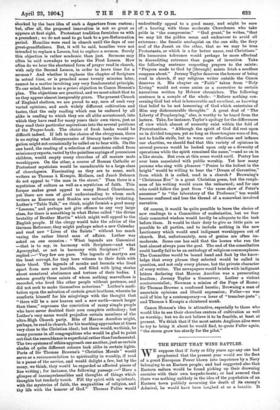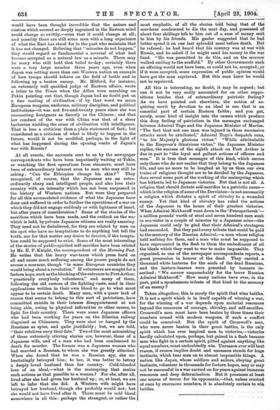would have been thought incredible that the nature and custom
which seemed so deeply ingrained in the Eastern mind could change so swiftly,—even that it could change at all; and possibly there are still some men with a long experience of what the East has stood for in the post who maintain that it has not changed. Believing that "miracles do not happen," they would regard so fundamental a reverent of what had become accepted as a natural law as a miracle. There may be many who still hold that belief to-day ; certainly there were a very large number three years ago, even when Japan was setting more than one Western nation an example of how troops should behave on the field of battle and in following up a beaten enemy. Mr. Mitford, for instance, an extremely well qualified judge of Eastern affairs, wrote a letter to the Times when the Allies were marching on Pekin pointing out that, though Japan had no doubt put on a fine coating of civilisation—if by that word we mean European weapons, uniforms, military discipline, and political institutions—it was not five-and-twenty years since she was massacring foreigners as fiercely as the Chinese; and that her conduct of the war with China was that of a sheer barbarian wielding the arms of civilisation with intelligence. That is less a criticism than a plain statement of fact; but considered as a criticism of what is likely to happen in the future, would it not be modified, perhaps, in the light of what has happened during the opening weeks of Japan's war with Russia P At all events, the accounts sent to us by the newspaper correspondents who have been impatiently waiting at Tokio, or watching the fleet operations from steamers, must have been of extraordinary interest even to men who may still be asking "Can the Ethiopian change his skin P" They recognised, of course, that the Japanese are an extra- ordinarily sharp and intelligent people, and also love their country with an intensity which has not been surpassed in the history of Western nations. But were they prepared for all this accumulated evidence of what the Japanese have done and suffered in order to farther the operations of a war on which they did not engage suddenly or with lightness of heart, but after years of consideration ? Some of the stories of the sacrifices which have been made, and the outlook on the war which is held, by private Japanese citizens are really amazing. They need not be disbelieved, for they are related by men ou the spot who have no temptations to do anything but tell the truth, nor for that matter any desire to deceive, if the tempta- tion could be supposed to exist. Some of the moat interesting of the stories of public-spirited self-sacrifice have been related by Mr. E. F. Knight, the correspondent of the Morning Post. He writes that the heavy war-taxes which press hard on all and cause much suffering among the poorer people do not arouse a murmur, though "in some European countries they would bring about a revolution." If volunteers are sought for a forlorn hope, such as the blocking of the entrance to PortArthur, "practically everybody volunteers," and many of them, following the old custom of the fighting caste, send in their applications written in their own blood to go to what must appear to be certain death. Many men, with a queer lank of reason that seems to belong to this sort of patriotism, have committed suicide in their intense disappointment at not being able, owing to physical infirmities or other causes, to fight for their country. There were some Japanese officers who had been working for years on the Siberian railway disguised as Chinamen. They were shot or hanged by the Russians rte spies, and quite justifiably ; but, we are told, "their relatives envy their fate." Two of the most astonishing of these extremely stirring stories are, however, those of a Japanese wife, and of a man who had been condemned to death for murder. The former was a Japanese woman who had married a Russian, to whom she was greatly attached. When she found that he was a Russian spy, she un- hesitatingly betrayed him; to her, it was better to betray a deeply loved husband than her country. Cold-blooded love of an ideal,—what is the mainspring that makes such actions as that possible to a woman? For she, after all, lived after she had given her husband up ; or, at least, we are left to infer that she did. A Western wife might have betrayed her husband, though she probably would not; but she would not have lived after it. There must be cold blood somewhere in all this : perhaps the strangest, or rather the All this is interesting, no doubt, it may be argued; hat can it not be very easily accounted for on other suppo- sitions besides that of extraordinary patriotic feeling As we have pointed out elsewhere, the notion of sc. quiring merit by devotion to an ideal is one that is an essential part of certain Eastern faiths; and you get, surely, some kind of insight into the causes which produce this deep feeling of patriotism in the messages exchanged between Admiral Togo and the Japanese Minister of Marine. "The fact that not one man was injured in these successive attacks must be attributed," Admiral Togo's despatch runs, "to his Majesty's glorious virtue." "While attributable to the Emperor's illustrious virtue," the Japanese Minister replies, the success of the eighth attack on Port, Arthur is due in part to "the loyal and gallant actions of officers and men." It is true that messages of this kind, which amuse only those who do not realise that they belong to the Japanese life, and are no more to he laughed at by us than our own trains of religious thought are to be derided by the Japanese, does reveal some part of the working of the mainspring which has hitherto led to Japanese victories. But that is not all. A religion that should dictate self.sacrifice M a patriotic cause— which is the religion of some of the Dervishes—is not necessarily a religion which dictates a spirit of chivalry to a wounded enemy. Yet that kind of chivalry has ruled the actions of the Japanese in the hours of their greatest victories. When Admiral Makharoff went down in the 'Petropavlovsk '— a million pounds' worth of steel and seven hundred men sunk in sea-water in a couple of minutes by a Japanese mine—the Japanese could only be glad that their Admiral's stratagem had succeeded. But they paid every tribute that could be paid to the memory of the Russian Admiral,—a man whose religion held nothing for them, and a man who must be supposed to have represented in the flesh to them the embodiment of all the ideals which they went to war to make impossible. They organised, so one of the newspaper correspondents reports, a great procession in honour of the dead. They carried . a thousand white lanterns for the souls of the dead Russians, and the lantern-bearers were preceded by banners in- scribed : "We sorrow unquenchably for the brave Russian Admiral Makharoff." How many nations have ever, in the past, paid a spontaneous tribute of that kind to the memory of an enemy P
Taken altogether, this is surely the spirit that wins battles: It is not a spirit which is in itself capable of winning a war, for the winning of a war depends upon material resources beyond the resources of courage, chivalry, and self-sacrifice. Cromwell's men must have been beaten by three times their numbers armed with modern weapons, if such a conflict could be conceived. But the spirit of Cromwell's men, who were never beaten in their great battles, is the only spirit which has ever inspired men to victories,—victories hardly calculated upon, perhaps, but gained in a flash because men who fight in a certain spirit, pitted against anything like equal numbers, must undoubtedly win. Unreason ever will beat reason, if reason implies doubt and unreason stands for huge instincts, which bear men on to almost impossible things. A nation like Japan, whose soldiers and sailors, obeying great instincts, volunteer in thousands for forlorn hopes, may or may not be successful in a war carried on for years against immense resources and deep determination. But it possesses at least one source of terror for its opponents,—that, unless crushed at once by enormous numbers, it is absolutely certain to win battles.











































 Previous page
Previous page